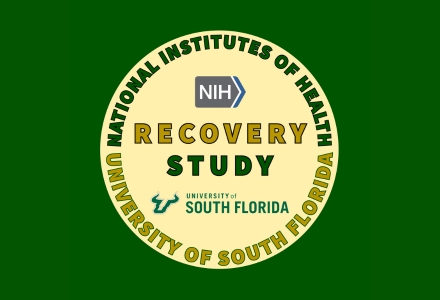Dr. Robert Schlauch, associate professor in the Department of Psychology, is leading a five-year clinical study on alcohol use disorder (AUD), aimed at examining the definition of recovery as a dynamic process.
Collaborating with esteemed researchers across the United States, Schlauch is dedicated to advancing clinical practice and improving treatment outcomes in AUD using multidisciplinary approaches.

Associate professor in the Department of Psychology, Dr. Robert Schlauch. (Photo courtesy of Robert Schlauch)
The study, funded by the National Institute on Alcoholism and Alcohol Abuse (NIAAA), is currently in the second year of a five-year R01 project with a total award amount of $2,797,961. The mission of the NIAAA is to disseminate knowledge about the adverse effects of alcohol on individuals' health through research and collaboration with institutions and policy makers.
Schlauch's research focuses on the diverse factors influencing alcohol and drug use behavior.
“My lab examines what role individual differences play in the emergence of problematic alcohol use and the ways in which people change,” Schlauch explained. “My current grant study is a clinical trial designed to examine definitions of AUD recovery, including understanding what factors are important for initiating versus maintaining behavior change. Given the individual and societal impacts of AUD, our goal is to find ways to utilize our current knowledge to help people change and create better treatment outcomes. This includes providing new conceptual frameworks with clinical applicability. Far too often research in the field, while excellent and advances our understanding of AUD, rarely makes it into clinical practice.”
Schlauch is leading the study alongside co-PI Dr. Stephen Maisto from Syracuse University and is collaborating with several internationally recognized researchers. To facilitate their research, they have partnered with the USF Psychological Services Center on the Tampa campus.
“The study is recruiting individuals 18-years and older from the Tampa Bay area community seeking treatment for AUD. Those meeting inclusion/exclusion criteria are provided with 12 weeks of cognitive behavioral therapy, an empirically supported treatment for AUD, and followed post-treatment ranging from 24-54 months. This work is being conducted at the Psychological Service Center on campus, which is the clinical psychology program’s in-house training clinic that provides psychological services to the community,” Schlauch said.
With the main focus of the study being on recovery, Schlauch discusses the nuanced nature of the term and elaborates on what recovery means within the context of AUD. He also examines the NIAAA's new definition of recovery, emphasizing the shift toward a focus on remission.

Logo used in the recruitment advertising for Dr. Robert Schlauch’s alcohol use disorder study. (Photo courtesy of Robert Schlauch)
“Recovery is a complex term and can mean different things for different people. For example, is ‘recovery’ a noun or a verb? Is a person ‘recovered’ or always in ‘recovery’? The current project is examining NIAAA’s new definition which states that someone is in recovery when there is a cessation of heavy drinking and remission from AUD symptoms. The new definition also discusses the importance of overall quality of life and well-being, but it is not explicitly part of the definition. While I think this new definition is heading in a positive direction by not requiring complete abstinence, which we have known for decades is not required for recovery, I also feel that the definition really is more about remission and not recovery,” Schlauch explained. “Recovery may be better defined when the underlying behavioral, neurobiological, and environmental mechanisms maintaining problematic alcohol use have changed, thereby reducing the risk of future lapses, relapses, or re-occurrence of the disorder. Our study, will examine these factors and expand on this new definition by distinguishing between remission versus recovery from AUD.”
One significant hurdle in studying recovery as a process is the ability to track participants over multiple years. Individuals facing alcohol-related issues may also be dealing with various other challenges, making participant retention a difficult task.
The study is currently in the active recruitment phase and has yet to analyze the data collected. Schlauch and his team are also partnering with Dr. Katie Witkiewicz from the University of New Mexico, who is also researching recovery and AUD. They aim to streamline their data collection process and potentially merge the data from both projects for future analysis.
With great hopes for this study, Schlauch anticipates that this research project will contribute to advancements for better understanding the ways in which people initiate and maintain positive treatment outcomes, benefiting both the scientific community and clinical practice.
“Our work has the potential to provide insight into the behavior change process specifically focusing on key clinical milestones such as treatment response, remission, recovery, lapses, and re-occurrences throughout the course of AUD recovery. By identifying which factors are important for initiating versus maintaining change during and after treatment, we aim to improve treatment outcomes. If successful, it could lead to changes in how treatment is conducted and provide avenues for adaptive treatment designs based on where someone is in the change process,” Schlauch said.
To learn more about Dr. Schlauch’s research visit the website for the Department of Psychology.
